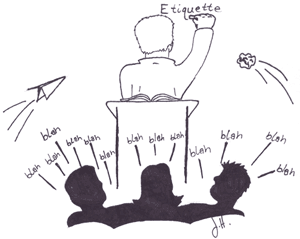.According to Humanities Professor Karen Marcotte, this is the worst it's been in her 19 years here at Palo Alto. Marcotte has been teaching for a total of 29 years, and she has never once felt the need to take time out of her class to explain behavior until this semester.
For the first time, Marcotte had to write up a contract entitled “Classroom Civility,” which she had all of her students sign.
On the document are five seemingly basic rules that certain students had trouble following. Rules such as no cell phones in any way shape or form; no make up application; no grooming; be considerate during discussion; and stay in class until dismissed.
Cartoon by James Huizar
“What we have is more of
a high school mentality coming on campus,” said Marcotte. “Let’s
be honest. In high school, it’s still not considered cool to be smart,
unfortunately.”
Marcotte finds the lack of civility to be disruptive to the learning process.
“Students not being prepared
for class and doing everything but class work,” she said. "For
example, they are checking their cell phones, they are putting on make up,
they are talking to their neighbors, and it’s not about class."
“Students not being prepared
for class and doing everything but class work,” she said. "For example,
they are checking their cell phones, they are putting on make up, they are talking
to their neighbors, and it’s not about class."
According to Marcotte, students would find the whole college experience easier
if they adopted some basic rules.
"Academically, students should come having read the assignment. They should
be prepared in the sense of text-books, and they should come wanting to learn.
As for civility, they should be respectful of everyone else in the room. They
should be polite, and they should pay attention to both the instructor and anyone
who is speaking," she said
.
With most students having family, work, spouse and other responsibilities, the
classroom has become the area where most of the learning takes place.
"I pay for my time in class, so when they rob me of time, they rob me of
money,” said Landon Wynton Ward, a freshman Computer Technology major.
“I expect pretty much the same courtesies I give, like turning off my phone,
not making any personal chit chat during class, and showing whoever is speaking
some respect.”
Even when the problem of excessive talking occurs, most students won’t
say anything to the student or the professor, a fact which leads Dora Lara to
believe that little to nothing will ever change.
"In one of my classes, there’s a person who talks through the entire
class,” said Lara, a sophomore Psychology major. “It’s a whisper,
but it’s just loud enough to where you can hear it, and it bothers the
whole class.”
The professor was informed of the student’s behavior but according to Lara,
nothing changed.
“They’ve told her several times, but she does it every class,”
she said. “I’d feel kind of awkward bringing something like that to
the professor’s attention, because then he’ll think I’m complaining
about his teaching technique or something.”
Most students agree that telling other students how to behave is not really
an option for them. According to Lisa Reyes, a freshman Education major, fear
of retaliation and character assassination keep her from speaking up.
"These girls in my class are always talking and no one ever tells them
anything," said Reyes. "I don't want to say anything because I don't
want them going against me. They're the kind of girls that go around and tell
people things about you.”
Reyes admits that she has a confrontational attitude but said, "They act
like little kids sometimes, and I don't really need or want that kind of pressure."
Palo Alto is not alone when problems of classroom civility come up.
According to Utah State University Professor Suzanne J. Warma, everyone could
use a reminder.
In an excerpt from her 1998 syllabus, Warma wrote, “Everyone who registers
for class is an adult. You are legally able to marry without parental consent,
buy a home, pay taxes, vote, work, defend your country in military service,
etc. You should be adult enough not to disturb others."
